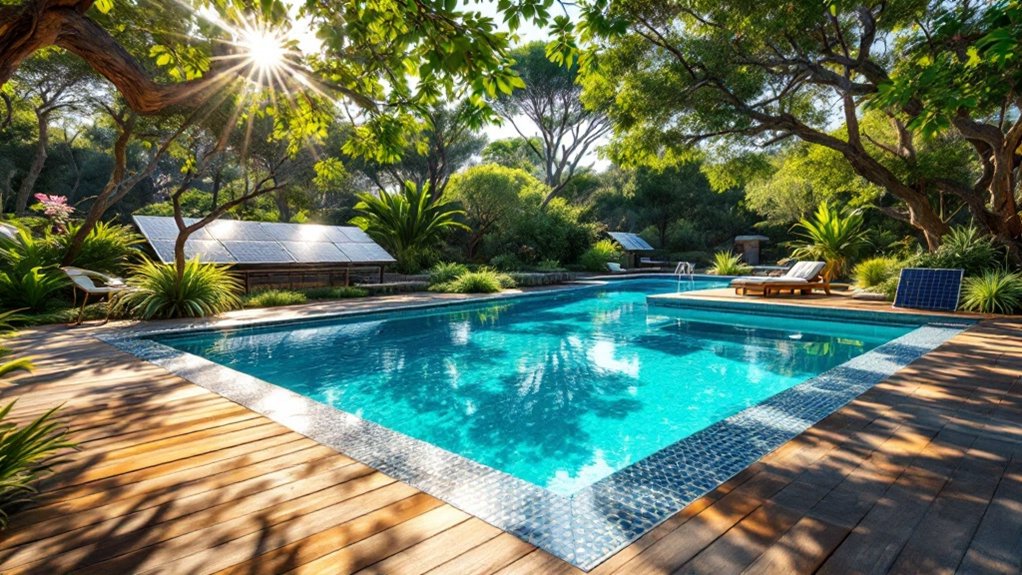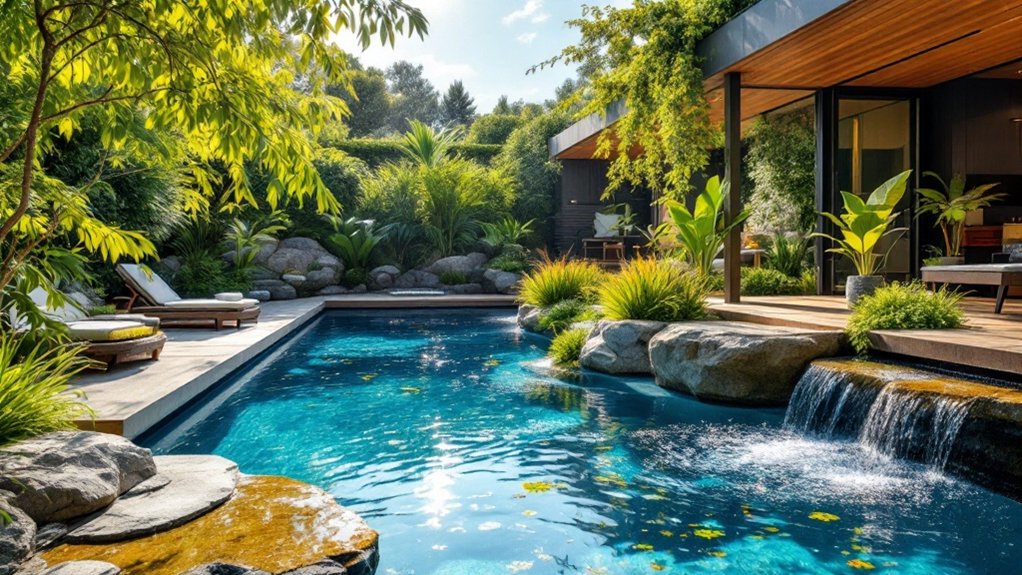Sustainable pool ideas focus on conserving water and energy while maintaining a functional and enjoyable space. Strategies include installing pool covers to reduce evaporation and integrating rainwater harvesting systems. Additionally, selecting energy-efficient equipment and exploring solar heating options can greatly lower energy consumption. The next steps involve examining natural filtration systems and landscaping choices that enhance ecological benefits. Each decision plays an essential role in creating an environmentally responsible pool area. What might these choices reveal about modern pool ownership?
Install a Pool Cover to Reduce Evaporation
When homeowners seek to enhance the sustainability of their swimming pools, one effective strategy is to install a pool cover to reduce evaporation. By utilizing a pool cover, homeowners can greatly minimize water loss, which not only conserves this essential resource but also reduces the need for frequent refilling. Covers maintain water temperature and prevent debris accumulation, leading to decreased heating costs and less maintenance. Additionally, they can enhance safety by preventing accidental falls. Various types of covers are available, including solar, mesh, and solid options, each catering to different needs and budgets. Ultimately, using a pool cover contributes to a more eco-friendly swimming experience, aligning with the broader goal of sustainable home practices.
Incorporate a Rainwater Harvesting System
Incorporating a rainwater harvesting system can considerably enhance the sustainability of a pool. This method not only provides a free source of water for filling and maintaining pool levels but also reduces reliance on municipal water supplies. However, installation considerations and best practices must be carefully evaluated to guarantee effective and efficient use.
Benefits of Rainwater Harvesting
Rainwater harvesting systems offer numerous environmental and economic benefits, particularly for pool owners seeking sustainable solutions. By collecting and utilizing rainwater, pool owners can greatly reduce their reliance on municipal water supplies, leading to lower water bills. This practice also decreases the demand on local water resources, promoting conservation efforts. Additionally, using harvested rainwater for pool maintenance minimizes the impact on surrounding ecosystems, as it reduces runoff and erosion. Rainwater is naturally soft, which can lead to fewer chemical requirements for water treatment and maintenance. Overall, implementing a rainwater harvesting system not only supports sustainable water management but also contributes to a more eco-friendly lifestyle for pool owners, enhancing the sustainability of their recreational spaces.
Installation Considerations and Tips
To effectively incorporate a rainwater harvesting system, careful planning and consideration of site-specific factors are essential. Homeowners should evaluate their roof size, local rainfall patterns, and the intended pool use to determine the appropriate system design. It is vital to select high-quality materials for gutters and storage tanks to guarantee durability and efficiency. Additionally, installation should include proper filtration systems to maintain water quality. Local regulations regarding rainwater collection must also be reviewed to ensure compliance. Integration with existing plumbing systems can maximize utility, while professional consultation may be beneficial for optimizing design. Finally, regular maintenance checks will help sustain the system’s performance, contributing to water conservation and energy efficiency in pool management.
Choose Energy-Efficient Pool Equipment
Selecting energy-efficient pool equipment can considerably reduce both environmental impact and operating costs. By investing in high-efficiency pumps, filters, and heaters, pool owners can minimize energy consumption while maintaining ideal performance. Variable-speed pumps, for instance, operate at different speeds, allowing users to adjust flow rates based on specific needs, which leads to significant energy savings. In addition, energy-efficient filters require less frequent replacement and consume less power during operation. When choosing heaters, models with higher energy ratings can provide warmth without excessive energy use. Moreover, incorporating automation systems can enhance equipment operation times and reduce unnecessary energy expenditure. Overall, prioritizing energy-efficient equipment is a proactive step toward a sustainable pool that benefits both the environment and the owner’s wallet. Regular maintenance of heater fan motors ensures that these systems operate efficiently, further contributing to energy savings.
Use Solar Heating Solutions
Incorporating solar heating solutions can additionally enhance the sustainability of a pool. These systems harness the sun’s energy to warm pool water, greatly reducing reliance on traditional heating methods that consume fossil fuels. Solar panels, typically installed on rooftops or nearby structures, collect sunlight and transfer heat to the pool water. This not only lowers energy costs but also minimizes greenhouse gas emissions. Moreover, solar heating systems can extend the swimming season, providing comfortable temperatures without the environmental impact of gas or electric heaters. Many homeowners find that integrating solar heating contributes to a more eco-friendly lifestyle, while often increasing the overall value of the property. Embracing this technology is a practical step towards sustainable pool ownership. Additionally, solar heating systems can work in conjunction with gas pool heaters to provide a hybrid solution for optimal efficiency and performance.
Implement Smart Pool Technology
As homeowners seek to enhance their pool’s efficiency and sustainability, implementing smart pool technology emerges as a valuable solution. This technology encompasses automated systems that optimize energy and water usage, contributing to a more environmentally friendly pool experience. Smart pool controllers monitor water temperature, chemical levels, and filtration cycles, ensuring precise management tailored to the pool’s specific needs. Additionally, remote monitoring capabilities allow owners to adjust settings and receive alerts from their smartphones, promoting proactive maintenance. Energy-efficient pumps and LED lighting integrated into smart systems reduce overall energy consumption. By adopting these innovations, homeowners can enjoy a more sustainable pool while greatly lowering their utility bills and minimizing their environmental impact.
Opt for Natural Pool Filtration Systems
While many homeowners prioritize aesthetics and functionality in their swimming pools, opting for natural pool filtration systems presents a sustainable alternative that prioritizes both environmental health and water quality. These systems utilize biological processes, such as plants and beneficial bacteria, to naturally filter and purify water, eliminating the need for harsh chemicals. By mimicking natural ecosystems, they create a balanced environment that supports aquatic life while ensuring clean swimming conditions. Additionally, natural filtration systems considerably reduce water consumption, as they require less frequent water changes compared to traditional pools. The integration of these systems not only enhances the ecological footprint of a property but also promotes a healthy swimming experience, making them an increasingly popular choice among environmentally conscious homeowners.
Landscape With Native Plants Around Your Pool
Landscaping with native plants around a pool not only enhances the aesthetic appeal but also contributes to a sustainable environment. Native plants require less water and maintenance compared to non-native species, making them an ideal choice for poolside landscaping. They are adapted to local climate conditions, reducing the need for synthetic fertilizers and pesticides. This not only saves water but also promotes biodiversity, attracting beneficial insects and wildlife to the area. Additionally, the use of native plants can help in soil stabilization, minimizing erosion and runoff. By creating a natural habitat, pool owners can enjoy a serene and visually pleasing environment while supporting local ecosystems. Overall, native landscaping around a pool is a practical step toward sustainability.
Schedule Regular Maintenance for Optimal Efficiency
Scheduling regular maintenance is essential for ensuring peak efficiency of a pool. Proper upkeep not only prolongs the lifespan of pool equipment but also enhances water quality, reducing the need for excessive chemicals. Regular inspections of pumps, filters, and heaters can identify potential issues before they escalate into costly repairs. Cleaning debris and maintaining ideal water levels prevent unnecessary energy consumption, contributing to sustainability efforts. In addition, routine checks on pool liners and seals can minimize water loss, fostering conservation. By adhering to a maintenance schedule, pool owners can enjoy a more efficient and eco-friendly swimming experience, ultimately leading to reduced operational costs. Emphasizing maintenance aligns with sustainable practices, promoting responsible water and energy use in pool management. Furthermore, regular checks for sharp objects enhance safety, ensuring a secure swimming environment for everyone.
Frequently Asked Questions
How Much Water Can a Pool Cover Save Annually?
The question of annual water savings from a pool cover is significant. Research indicates that a pool cover can conserve up to 20,000 gallons of water yearly, depending on climate and usage, enhancing resource efficiency.
What Are the Benefits of Native Plants for Pool Landscaping?
The benefits of native plants for pool landscaping include reduced water consumption, lower maintenance needs, and enhanced biodiversity. They attract local wildlife, thrive in regional climates, and contribute to a more sustainable and aesthetically pleasing environment.
Can I Use a Pool Heater With Solar Panels?
The inquiry about using a pool heater with solar panels reveals a feasible option. Solar panels can effectively power pool heaters, providing an energy-efficient solution that harnesses renewable energy for maintaining comfortable water temperatures throughout the swimming season.
How Often Should I Maintain My Pool for Energy Efficiency?
The frequency of pool maintenance greatly impacts energy efficiency. Regular cleaning, chemical balancing, and equipment checks every one to two weeks can enhance performance, reduce energy consumption, and extend the lifespan of pool systems.
What Is the Cost of Energy-Efficient Pool Equipment?
The cost of energy-efficient pool equipment varies widely, typically ranging from a few hundred to several thousand dollars. Investing in such equipment can lead to significant long-term savings on energy bills and maintenance costs.
Conclusion
Incorporating sustainable practices in pool design and maintenance not only conserves water and energy but also enhances the overall environment. By utilizing pool covers, rainwater harvesting, energy-efficient equipment, and natural filtration systems, pool owners can greatly reduce their ecological footprint. In addition, smart technology and native landscaping contribute to both the aesthetic appeal and the health of local ecosystems. Ultimately, these sustainable pool ideas foster a harmonious balance between leisure and environmental responsibility.




